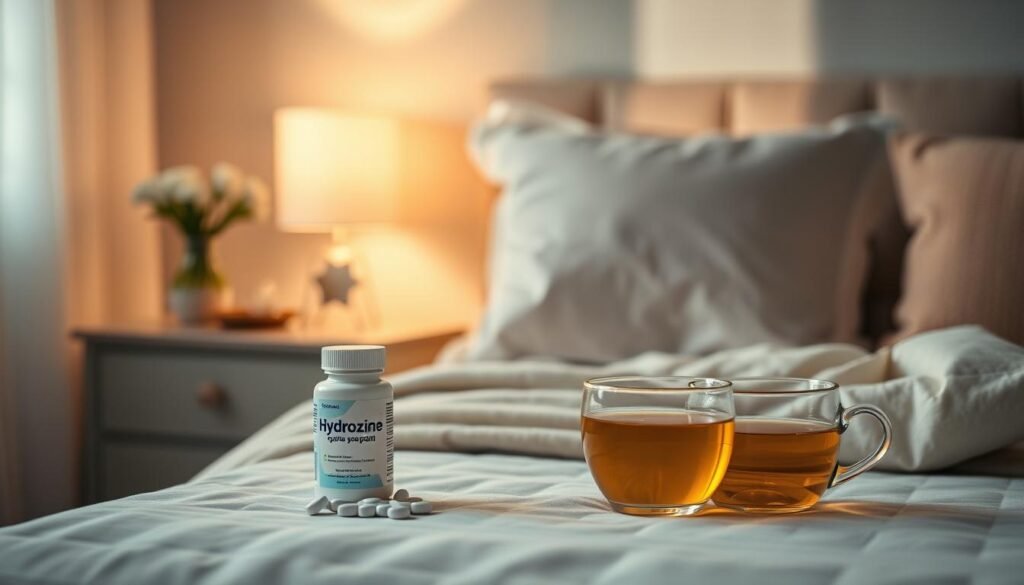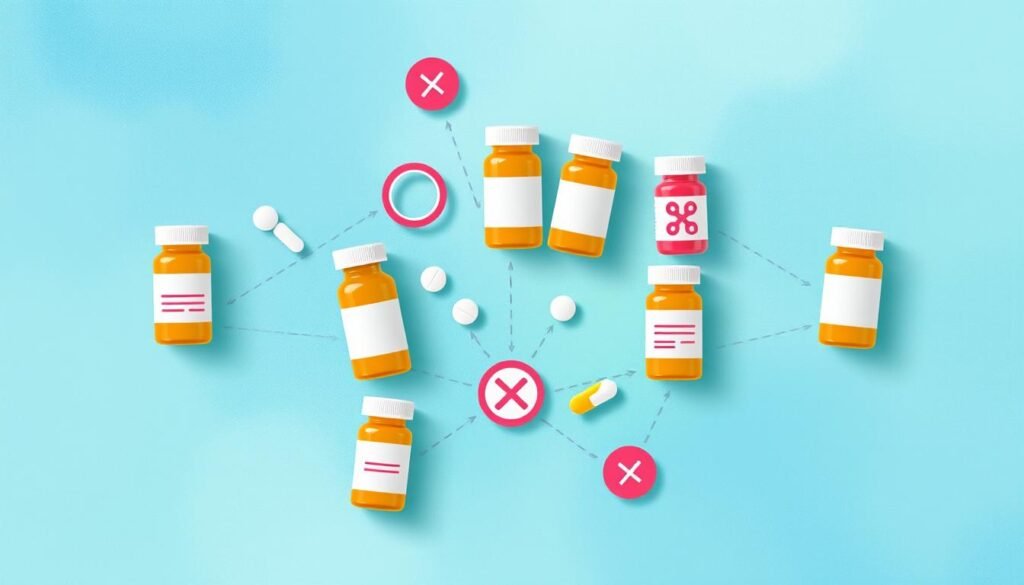Surprisingly, over 30 percent of adults in the US will face an anxiety disorder sometime. Medications like hydroxyzine are vital for easing anxiety in many people. This antihistamine is often given for quick anxiety relief. Yet, knowing the side effects of hydroxyzine for anxiety is key. Being informed lets users talk to doctors about risks and benefits. In this piece, we’ll explore how hydroxyzine works, its side effects, how much to take, how it might interact with other drugs, and how to safely use it for all ages.
Key Takeaways
- Hydroxyzine is often prescribed for acute anxiety relief.
- Common side effects include drowsiness and dry mouth.
- Older adults may require a smaller dosage due to increased sensitivity.
- It is not typically used long-term for anxiety management.
- Hydroxyzine may interact with various medications and pre-existing conditions.
- Children can be prescribed hydroxyzine, but precautions must be taken.
- Consulting a healthcare provider about side effects is crucial for user safety.
What is Hydroxyzine?
Hydroxyzine is a first-generation antihistamine. It’s mainly used to treat anxiety and tension from emotional issues. It’s great for easing allergy-related skin reactions and as a sedative before surgery. Hydroxyzine works by blocking histamine receptors, which reduces allergy symptoms and also calms the brain’s anxiety-related activity.
This medicine comes in tablets, capsules, and syrup. You need a doctor’s prescription to get it. It’s especially good for treating anxiety, helping people feel better emotionally. Most people start feeling its effects in 15 to 30 minutes. The strongest effects happen within two hours after taking it.
Hydroxyzine is proven to help control anxiety well when used correctly. It comes in forms like hydroxyzine hydrochloride and hydroxyzine pamoate (Vistaril). Many find it effectively eases their symptoms. For more info, check out the hydroxyzine antihistamine details online.
How Hydroxyzine Works for Anxiety
Hydroxyzine is a powerful drug for anxiety relief, working fast when needed. It’s mainly an antihistamine, targeting H1 receptors in our bodies. By blocking these receptors, it stops histamine’s effects that can lead to anxiety, easing your mind.
For quick relief, hydroxyzine is a top choice. You could feel better 15 to 60 minutes after taking a tablet. In fact, studies prove hydroxyzine outperforms a placebo in managing generalized anxiety disorder, highlighting its effectiveness.
As an FDA-approved anxiety treatment, hydroxyzine is safe from dependency worries. Doses usually span from 50 to 100 mg, taken up to four times a day. It’s also useful for sleep troubles and nausea linked to anxiety.
Hydroxyzine’s safety and non-addictive nature make it a reliable option. However, users should note possible side effects like drowsiness, dry mouth, and dizziness.
Dosage is key to its success and how quickly it works. Doctors may tweak it to hit the sweet spot for anxiety control. Hydroxyzine’s prompt and effective relief makes it a go-to for many seeking peace from anxiety.
Hydroxyzine for Anxiety Side Effects
Anxiety medications, like hydroxyzine, help a lot with anxiety. But it’s important to know the side effects. Knowing the side effects helps people make smart choices about their treatment.
Common Side Effects
Hydroxyzine can cause several side effects. These include:
- Drowsiness
- Dizziness
- Dry mouth
- Fatigue
- Headache
- Constipation
- Confusion
Hydroxyzine drowsiness and dizziness make it hard to do things like driving. Older folks might feel more sleepy or confused. It’s important they are checked on often during treatment.
Serious Side Effects
Most people are okay with hydroxyzine, but some serious side effects can happen. They include:
- Severe allergic reactions
- Rapid heart rate
- Difficulty breathing
- Seizures
If someone has scary symptoms like chest pain, they need to get help right away. This quick action helps prevent bigger problems.
| Side Effect Type | Examples | Incidence |
|---|---|---|
| Common | Drowsiness, Dry mouth, Dizziness | Frequent |
| Serious | Allergic reaction, Seizures | Rare |
Talking to doctors about any side effects is key to staying safe. This helps make sure the treatment works well.
Hydroxyzine and Sedation
Hydroxyzine, also known as Vistaril, is a good choice for anxiety control and sedation. It is very calming, making it useful for quick relief. Knowing how hydroxyzine causes sedation and drowsiness is key for patients and caretakers. This knowledge helps use the medication safely and improve how well it works.
Understanding Drowsiness and Hydroxyzine
Hydroxyzine often makes users drowsy. This drowsiness is helpful for getting rest, especially before surgery that needs anesthetics. If taking hydroxyzine, avoid driving or using heavy machinery.
Mixing hydroxyzine with alcohol or drugs that slow the brain can increase sedation. This could be risky. It’s wise to talk to doctors about how different medications interact for safe use.

People taking hydroxyzine should watch how it affects them, focusing on the level of drowsiness. Side effects like dizziness, headache, and dry mouth can happen but usually go away after stopping the drug. Properly handling hydroxyzine sedation can lead to successful anxiety treatment and a better life.
Hydroxyzine Dosage for Anxiety Treatment
Finding the right hydroxyzine dosage anxiety differs for each person. It depends on age and what you’re treating. For grown-ups, you usually take 50 to 100 mg up to four times daily. Make sure your total daily dose stays in this range.
Kids 6 and up can take 50 to 100 mg per day, split into several doses. But, for kids under six, don’t go over 50 mg a day. This amount should be broken down as your healthcare provider says. It’s super important for parents to follow the doctor’s orders closely.
Want to know more about hydroxyzine dosages? Check out this link. It has lots of info on how to use the medication right.
Potential Drug Interactions with Hydroxyzine
For those using hydroxyzine for anxiety, knowing about drug interactions is key. This drug can make you sleepy, dizzy, and can have other effects. When mixed with certain substances, these issues may get worse or cause serious health problems.
Common Medications to Avoid
You need to know which medicines don’t mix well with hydroxyzine. Some key types to avoid include:
- CNS Depressants: Benzodiazepines, opioids, and muscle relaxants can make you even sleepier. It’s not safe to combine them.
- Drugs that Prolong QT Interval: Some antidepressants and antiarrhythmics can lead to dangerous heart arrhythmias with hydroxyzine.
- Anticholinergic Medications: Mixing hydroxyzine with antipsychotics or tricyclic antidepressants can worsen anticholinergic effects.
- Alcohol: Mixing it with hydroxyzine increases drowsiness and the risk of breathing difficulties. Avoid it.
- Grapefruit Juice: It can raise hydroxyzine levels, posing risks of harmful QT-prolongation.
- Illicit Drugs: Drugs like cannabis can amplify sedation if taken with hydroxyzine.
Talk to your doctor about all drugs, supplements, and over-the-counter meds you’re taking to ensure hydroxyzine’s safe use. Knowing about these interactions can reduce risks and make the medication work better for you.

Hydroxyzine Usage in Different Age Groups
Hydroxyzine helps with anxiety in different ages. It’s important to adjust the dose for elderly people and kids, as they have specific needs. This makes sure the drug works well while reducing side effects.
Considerations for Elderly Patients
For older people, hydroxyzine requires caution. Those over 65 might react strongly to the medication. This could mean changing the dose. Health conditions like liver or kidney problems also play a role. This affects how well hydroxyzine works and its safety. So, doctors should keep a close watch on these patients. They can then spot any bad reactions early.
Use in Pediatric Patients
Kids as young as 2 can take hydroxyzine for certain problems. It’s usually safe, but dosing needs care. It must match the child’s weight and age. Side effects need watching by parents and caregivers too. If symptoms don’t get better, tell the doctor.
Side effects like dry mouth or headaches are common but often not serious. But, serious ones like allergies or heart issues need quick action. It’s key to watch for risks, especially since studies link hydroxyzine to more tic disorders, anxiety, and behavior issues in kids younger than 10.
What to Do if You Experience Side Effects
Talk to your doctor if you are dealing with hydroxyzine side effects. Getting in touch early can help you find effective solutions. If you get drowsiness, dry mouth, or nausea, these usually get better after a few days. You can lessen these effects by drinking more water and changing when you take your medicine.
If you have severe side effects, act quickly. Having chest pain, dizziness, or trouble breathing means you need urgent medical help. Keeping a current list of all medicines and telling your doctor about any new or worse symptoms is really helpful.
If bad side effects don’t go away, a psychiatrist might change your dose or suggest a different medicine. Even though hydroxyzine works well, managing side effects is key to doing well with the treatment.

| Common Side Effects | Serious Side Effects |
|---|---|
| Drowsiness | Chest pain |
| Dry mouth | Irregular heartbeat |
| Headache | Severe dizziness leading to fainting |
| Nausea or vomiting | Difficulty breathing |
| Fatigue | Severe allergic reactions |
Storage and Disposal of Hydroxyzine
It’s key to store hydroxyzine right to keep it working well. Keep it in a closed container away from moisture and heat. Doing so in a room temperature setting helps it stay effective for anxiety relief.
Hydroxyzine disposal is key for safe medication handling. Don’t toss unused medicine without care. A pharmacy can advise on safe disposal, or check local trash rules. This helps avoid accidental use by kids or pets.
Dumping hydroxyzine in the toilet can harm the environment. Proper storage and disposal protect both the user and nature. For dosages and handling info, click here.
Conclusion
Knowing the side effects of hydroxyzine is key for those treating anxiety. Nearly one-third of U.S. adults battle anxiety disorders. Hydroxyzine helps manage symptoms, especially in generalized anxiety disorder cases.
But it’s just as vital to know about the side effects like dizziness, dry mouth, and sleepiness. These can affect your day-to-day life.
Patients should talk openly with their doctors about hydroxyzine. Discuss any side effects felt and the advice to use it for no more than four months. This way, you can use hydroxyzine safely and get its full benefits for anxiety.
Used right and under a doctor’s care, hydroxyzine can really help ease anxiety symptoms. Making sure you’re safe, limiting how long you use it, and watching for side effects are key to good results. These steps help those struggling with anxiety feel better.